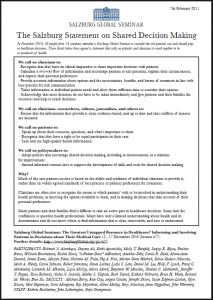March 30th, 2011 by DavedeBronkart in Health Policy, News
No Comments »

 Last Thursday at the headquarters of the British Medical Journal in London, an important announcement will be made about patients’ rights to be actively involved in decisions about their treatment. Below is the press release about it.
Last Thursday at the headquarters of the British Medical Journal in London, an important announcement will be made about patients’ rights to be actively involved in decisions about their treatment. Below is the press release about it.
The subject is shared decision making, which we’ve been posting about recently (series here; initial post here.) Developed by the participants in a Salzburg Global Seminar last December, the document is called the Salzburg Statement. The pivotal distinction here is the difference between informed consent, in which the physician assesses the options and selects one, and gets your consent to do it; and informed choice, in which clinicians tell you the options, with all the pros and cons, and let you choose, based on your preferences.
Click the image to download. (It’s an A4 PDF; to print, those using letter size paper should select “Page Scaling: Fit.”)
Here’s today’s press release: Read more »
*This blog post was originally published at e-Patients.net*
March 19th, 2010 by EvanFalchukJD in Better Health Network, Health Policy, Opinion
No Comments »

The Jobbing Doctor, a primary care doctor in the UK, writes about the British version of what Americans call “Pay for Performance,” or “P4P.”
He says something I’ve said many times before (like here, here, and here). Which is this: incentives fail because they try to treat medicine as an assembly line process, when it’s not.
But what’s most interesting about his post is that it could have been written by a doctor from anyplace on the planet Earth.
The Jobbing Doctor talks about a UK program that started in 2004 called the Quality and Outcomes Framework, or “QoF.” Now, the American “P4P” is a much more catchy name, so score one for American marketing. But it doesn’t matter what you call it – that which we call a rose would, by any other name smell as sweet. Read more »
*This blog post was originally published at See First Blog*
February 2nd, 2010 by BobDoherty in Better Health Network, Health Policy
3 Comments »

Yesterday, I borrowed liberally from Dr. Seuss’ “Oh, the Places You Will Go” to describe the “weirdish, wild space” – The Waiting Place – in which we now find health reform.
This got me thinking about The Waiting Place in a different context: the time it takes to get an appointment with a physician. Anyone one of us who has had to wait weeks, or even months, for an appointment would agree that The Waiting Place is, as Dr. Seuss described it, a “most useless place” to be.
Critics of the pending health reform bills, like Conservatives for Patient Rights argue that they will lead to longer wait times for appointments. Their argument being that “government-run” health care, as exists in Canada or the United Kingdom, has been demonstrated to result in long waits for medical appointments.
I would dispute the premise that the reforms being considered by Congress are akin to the systems in place in Canada or the United Kingdom. Read more »
*This blog post was originally published at The ACP Advocate Blog by Bob Doherty*
January 30th, 2010 by Berci in Better Health Network, News
No Comments »

You may have heard about Andrew Wakefield who tried to find a link between MMR vaccines and autism. He has published several papers. Now it turns out he acted unethically in carrying out his research according to a medical regulator.
Doctor Andrew Wakefield’s 1998 study, published in the Lancet medical journal, said there might be a connection between the measles, mumps and rubella (MMR) injection and autism.
The suggestion horrified parents and led to a slump in the number of youngsters getting the jab, as well as triggering heated debate in medical circles.
In a ruling Thursday, the General Medical Council attacked Wakefield for “unethical” research methods and for showing a “callous disregard” for the youngsters as he carried out tests.
This included taking blood samples from children at his son’s birthday party for five-pound payments.
Why am I writing about it?
Because we all have to learn from this. Read more »
*This blog post was originally published at ScienceRoll*
January 11th, 2010 by DrRich in Better Health Network, Health Policy, Opinion
No Comments »

As has been pointed out (pointedly) to DrRich, we do not have death panels in the United States. And indeed, considering that we’re not conducting military tribunals for Islamist terrorists who have tried (or succeeded in) killing and maiming as many of us as possible, it seems relatively unlikely that we’d assemble death panels (which sound even less due-process-friendly than military tribunals) for American patients.
What we will have, however, is a federally-mandated assembly, body, committee, commission, board, diet, parliament, or posse (but not a panel) of experts which will carefully evaluate all the objective clinical evidence regarding a particular medical treatment, and make “recommendations” to doctors about whether or when to use that treatment. The model which frequently has been offered up for our consideration, as we contemplate the workings of such a non-death-panel, is the British National Institute for Clinical Excellence, or NICE. Read more »
*This blog post was originally published at The Covert Rationing Blog*
 Last Thursday at the headquarters of the British Medical Journal in London, an important announcement will be made about patients’ rights to be actively involved in decisions about their treatment. Below is the press release about it.
Last Thursday at the headquarters of the British Medical Journal in London, an important announcement will be made about patients’ rights to be actively involved in decisions about their treatment. Below is the press release about it.














